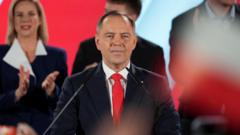An alarming surge in anti-Ukrainian sentiment has emerged in Poland, particularly affecting the 2.5 million Ukrainian refugees residing there, against the backdrop of a polarizing presidential election campaign. Incidents of bullying, public transport abuse, and online xenophobia are reported, stirring fear among the Ukrainian community.
Rising Anti-Ukrainian Sentiment in Poland Amid Presidential Elections

Rising Anti-Ukrainian Sentiment in Poland Amid Presidential Elections
Ukrainian refugees face increasing hostility in Poland, raising concerns over xenophobia as political tensions grow.
Svitlana, a Ukrainian mother living in Poland, recalls how her daughter once thrived in school, but has recently endured bullying and ridicule since new anti-Ukrainian sentiments have surfaced. “A boy told her, ‘Go back to Ukraine,’” Svitlana shared, expressing her shock and concern. The escalating abuse reflects a broader trend, with Ukrainians facing hostility not only in schools but also in public spaces, prompting many to reconsider their future in Poland.
Recent commentary from other Ukrainian families highlights a worrying shift in attitudes. "At work, I hear people saying Ukrainians cause trouble," Svitlana noted. "My friends are talking about going back home because they don’t feel welcome here anymore."
In the wake of Russia's invasion of Ukraine, Poland once showed remarkable solidarity with Ukrainian refugees, offering assistance and refuge to those fleeing war. However, current political climates are jeopardizing this support. Research indicates that public approval for accepting Ukrainian refugees has dipped from 81% to 50% in just a few years, coinciding with far-right political rhetoric and anti-Ukrainian propaganda seeping into public discourse.
Natalia Panchenko, head of the 'Stand with Ukraine' Foundation, confirmed a rise in anti-Ukrainian abuse and online hostility, stating, "Many Ukrainians are in Poland because of war and are now facing discriminatory actions." She expressed that the initial wave of compassion has been overshadowed by negative sentiments fueled by disinformation.
As the Polish presidential elections draw near, candidates are cautiously navigating the complex issue of Ukraine. Front-runner Rafal Trzaskowski, while the most pro-Ukrainian candidate, has tempered his support, reflecting shifting public attitudes and fears of voter backlash. Meanwhile, candidates from the far-right, like Slawomir Mentzen and Grzegorz Braun, openly express anti-Ukrainian views, further polarizing the vote.
Disinformation campaigns are worsening public opinion, with narratives circulating that portray Ukrainians as a burden to Polish society. NGOs are monitoring these developments, linking the spread of anti-Ukrainian sentiment to foreign propaganda efforts, particularly from Russia.
As tension rises, the Ukrainian community in Poland faces an uncertain future, worrying for their safety and acceptance in a country that was once a safe haven.





















